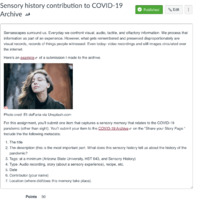Elemento
Grateful For An Injury
Título (Dublin Core)
Grateful For An Injury
Description (Dublin Core)
In early April of this year, I had driven to the oceanfront for a few hours of morning surfing. The weather the previous day created ideal swells. Growing up in and around the ocean, surfing has always been a way of life for me. After several sets and a few hours, I proceeded in to the beach and stepped on an embedded oyster shell. At first, it felt like a bad bruise, but it was a horrible gash on the bottom of my right foot. I knew after looking that I needed stitches. I wrapped my foot in a towel, limped off with my board, secured things as best I could, and drove myself to the nearest ER. I was checked in, placed in a room, etc. Since the wound was not bleeding profusely, my foot was placed in a basin of antibacterial solution. After the preliminaries of great care, I waited for the doctor. The door to my room was slightly cracked open, at least enough to hear much activity in the main ER area. And I waited. Over the next several hours, the ER became a flurry of chaos. But it was not what what I could see, but could hear with the door nearly closed. Multiple patients were brought in by ambulances with breathing difficulty. The rooms filled up and some stretchers started lining the halls. A nurse poked her masked face in every so often to ask how I was doing. As i waited, i learned that I was a low priority, and rightfully so. I was not dying, nor gasping for breath. I kept hearing "God! I can't breathe!" These were the sounds of the early pandemic in April. Male and female voices, struggling through broken sentences, vitally needing air under the acute distress of COVID infection. With nothing to read, and no phone (my beach excursions do not entail smartphones because of sand), I became increasingly aware of audible sensations and the suffering of others trying to breathe. Over the next few hours, I was overwhelmed with a sense of gratitude; not because of my injury, but because I could breathe. I knew my foot would be fine with some stitches and maybe a tetanus shot, and I was, wth some crutches later upon discharge. Yes, incomplete sentences imply breathing problems, but gasping and cursing, just the struggle to live for oxygen, is what the early pandemic taught me in the ER—to be grateful for just a foot injury and excellent medical care. I was not dying, but other patients were fighting acute lung infections. The news, especially during the early pandemic, gave us video of hospitals overwhelmed with critical patients and ventilators. But for me, it was the audible sensations from the door slightly open that conveyed a profound sense of the quiet insidiousness of COVID. Some infections only bring a fever. Some folks are infected and never know it due to lack of symptoms. Yet, it is the critical ones, those that cannot breathe, that can impart a perspective of gratitude to someone like me with a routine foot laceration. Retrospectively, I look back on this experience, my ER day, and recall those voices. I never saw those people struggling, but I did not have to see them to come away with gratitude for a simple surfing accident. Some of those patients were undoubtedly placed on a ventilator in the ICU, and perhaps their outcome was even worse. I ended up discharged to home.
Date (Dublin Core)
April 10, 2020
Creator (Dublin Core)
Lloyd Renstrom
Contributor (Dublin Core)
Lloyd Renstrom
Event Identifier (Dublin Core)
HST643
Partner (Dublin Core)
Arizona State University
Tipo (Dublin Core)
text story
Controlled Vocabulary (Dublin Core)
English
Emotion
English
Health & Wellness
English
Healthcare
English
Recreation & Leisure
English
Public Health & Hospitals
Curator's Tags (Omeka Classic)
ventilator
emergency room
COVID-19
oxygen
surfing
Contributor's Tags (a true folksonomy) (Friend of a Friend)
ASU
HST 643
Audible Sensory History
Linked Data (Dublin Core)
Date Submitted (Dublin Core)
10/13/2020
Date Modified (Dublin Core)
10/13/2020
This item was submitted on October 13, 2020 by Lloyd Renstrom using the form “Share Your Story” on the site “A Journal of the Plague Year”: http://mail.covid-19archive.org/s/archive
Click here to view the collected data.
